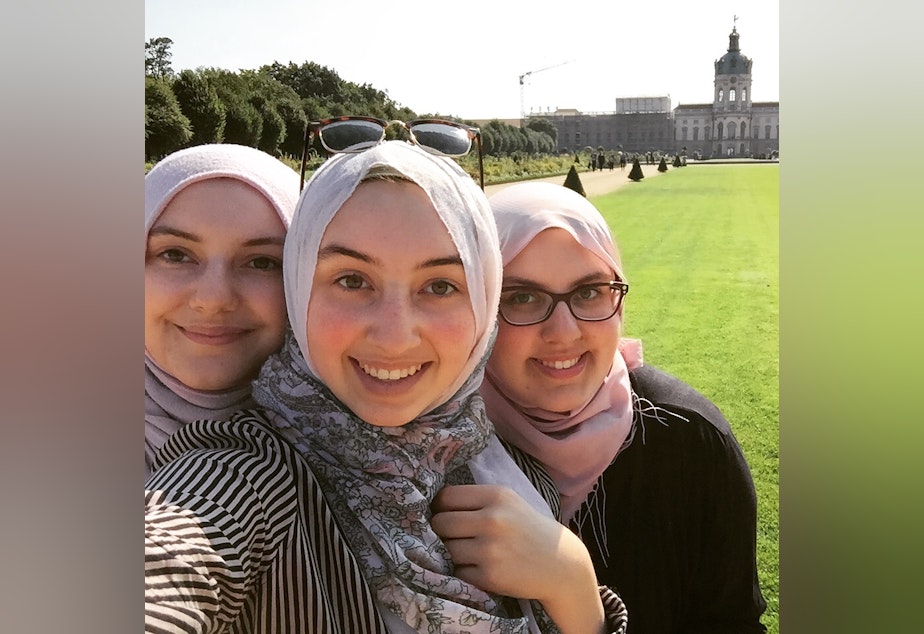'When It's A White Guy, No One Gets Hurt After The Attack. But When It's A Muslim...'

After the deadly shooting in San Bernardino, California last week Muslims across the country held their breath.
Was the shooter a Muslim? They hoped not.
But he was. Aliya Al-Sadi is a student at the University of Washington. Aliya spoke with her sister – KUOW producer Amina Al-Sadi – about going to class the next day, and how she processed the news.
Aliya Al-Sadi: "My professor came in and kind of sighed. She said, 'My heart is really saddened today.' The room just fell silent. And she said, ‘You know. It's come out he's a Pakistani.’ One of the girls started crying because she's Muslim. And we start just unpacking why humans do these kinds of things."
Amina Al-Sadi: "Did you cry?"
Aliya Al-Sadi: "My mind was blank. Every time this happens, you're ashamed, you're embarrassed, and you're constantly defending your faith. You're constantly pulling out the verses from Koran; it's this constant kind of defending. And it comes to this point where you don't know what else to say."
Amina Al-Sadi: "What were your classmates saying?"
Aliya Al-Sadi: "When the Paris attacks happened, Muslim students in the class brought up why it's wrong and reasons why Islam doesn't support it. And then this happened. So I was like, 'What else can I say?' I just hoped that they would just believe it."
Amina Al-Sadi: "After the Paris attacks. I was holding my breath, because everybody kept saying it could happen here. I thought, ‘Oh my God, please, please, please, never let it ever happen here.’ For many many reasons. When this shooting happened I thought. 'No, no, please don't be a Muslim.’"
Aliya Al-Sadi: "I right away thought, 'Oh it's a crazy white guy.'"
Amina Al-Sadi: "Like Colorado."
Aliya Al-Sadi: "It’s bad, but you hope, just don't be a Muslim."
Amina Al-Sadi: "When it's a white guy, no one else gets hurt after the attack. But when it's a Muslim or a person of color, people are going to get hurt afterward.
"I didn't realize I was holding my breath until my phone lit up, and they had released the name of the guy. And when I saw it was the name Sayed, I started panicking. I got so anxious and so upset.
"As I was driving home, I was on the freeway, and I was going the speed limit, and I noticed the car behind me was tailing me. In my mind, I was thinking, 'Was this someone who saw that I'm wearing a headscarf and is angry and is trying to follow me? You have this panic that goes through you.
"They drove away, and I am fine and not hurt. But you look at the world so differently when you're both an American and a Muslim."
Aliya Al-Sadi: "I realized maybe I need to be more careful when I was at prayer on Friday – that was right after the Paris attacks. The imam said, ‘To our Muslim sisters. I just want to say, May God be with you. Be safe out there. Because you are being targeted.' And it was like, whoa. I've never been told that.
"It hit me in the face just how real the stigma is."
Amina Al-Sadi: "But at the same time, when we were at the mall a couple weekends ago, there with this family – your average Caucasian family. They were sitting next to the Jamba Juice.
"And I noticed as we were walking toward them, the dad was trying to catch our eye. I looked at him, and he gave me this wide smile, and as we were passing, the woman said as-salamu alaykum. I almost burst into tears because for all of the horrible stares or the derogatory comments, there are still people out there that show smiles and love.
"For me the most important thing is to remember to keep showing the world that we're just normal people."

